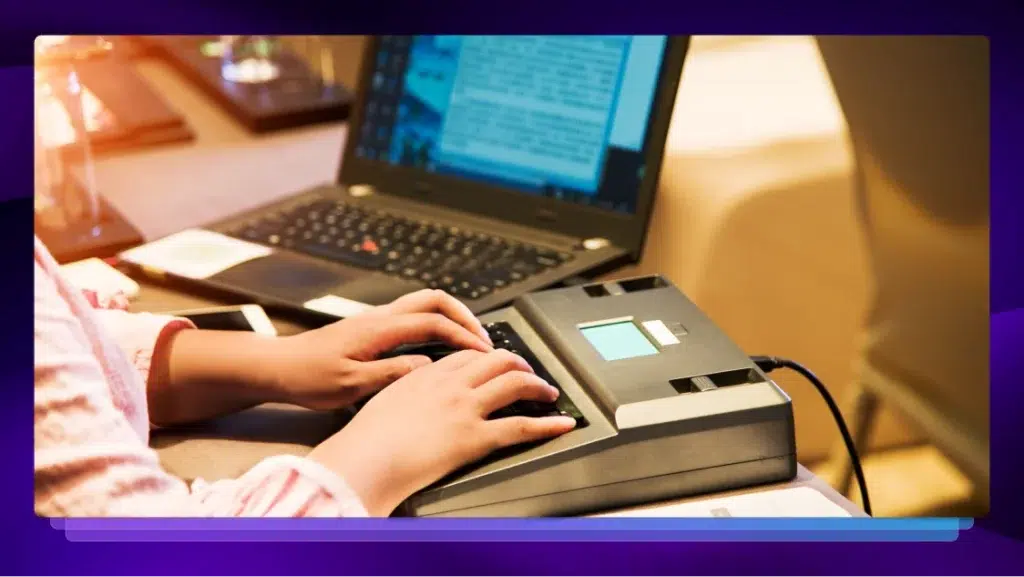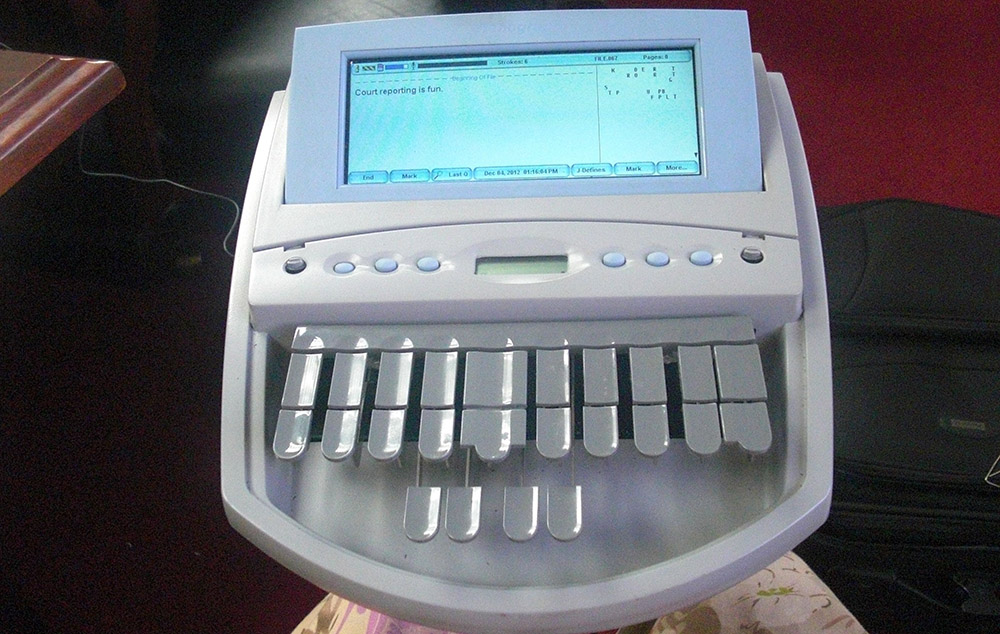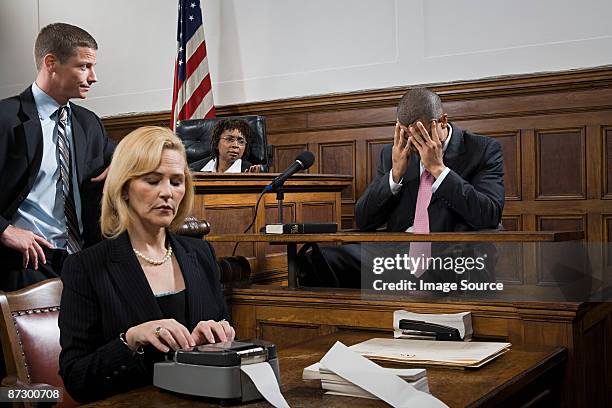How to Start a Career as a Professional Court Typist: Step-by-Step Guide
How to Start a Career as a Professional Court Typist: Step-by-Step Guide
Blog Article
Discover the Important Abilities and Duties of a Court Typist in Today's Lawful Landscape
As a court typist, you hold an important placement in the lawful system. Your abilities exceed just typing; they entail understanding intricate lawful terms and procedures while guaranteeing precision in every file. You team up carefully with judges and attorneys, making your role crucial for reliable interaction. However what details skills do you require, and how can you adjust to the ever-evolving technological landscape? Allow's discover this further.
The Duty of a Court Typist in the Judicial System
As the backbone of the judicial system, a court typist plays an important role in ensuring that lawful proceedings are precisely documented. You're accountable for recording every little thing from witness testimonies to courts' judgments, catching every information with precision. Your work assists keep a long-term and clear document of court tasks, which is important for future reference and appeals.In the court, you're often the unsung hero, quietly assuring that all talked words become written records. You maintain confidentiality, comprehending the delicate nature of legal matters. You likewise work together carefully with courts, staffs, and attorneys to guarantee the smooth flow of info. By working effectively under stress, you contribute to the total efficiency of the judicial procedure. Your focus to information and dedication to precision not only maintain the honesty of the court yet additionally sustain the broader quest of justice in society.
Crucial Abilities Required for Court Typists
Court typists need an unique mix of abilities to master their important role within the judicial system. Most importantly, you have to have superb typing skills, frequently accomplishing rates of 70 words per min or more. Precision is vital; even a small mistake can lead to substantial misconceptions in legal documents. You'll likewise need solid focus to detail, making sure every word is transcribed correctly.Additionally, great organizational abilities are essential for handling numerous instances and records effectively. Being tech-savvy is necessary, as you'll use various software programs for data processing and document administration. Solid communication abilities help you engage with courts, attorneys, and various other court personnel effectively.Lastly, a feeling of professionalism and discretion is a must, as you'll handle delicate details daily. By developing these abilities, you'll be well-prepared to add significantly to the court room setting.
Understanding Lawful Terms and Procedures
As a court typist, you need to comprehend key legal terms and procedures to perform your work efficiently. Recognizing these concepts not just aids you record accurately however additionally guarantees you can comply with the circulation of court process. Allow's discover the important legal vocabulary and an overview of court processes you must understand.

Trick Legal Terms
Recognizing crucial lawful terms is important for any individual operating in a court room setting. You'll frequently come across terms like "plaintiff," which refers to the individual launching a lawsuit, and "defendant," who replies to the claims. Recognizing the difference in between "civil" and "criminal" instances assists you understand the context of the procedures. Knowledge with "subpoena" assurances you recognize the lawful records engaging witnesses to affirm. Additionally, terms like "evidence" and "testament" are essential, as they connect straight to the details presented in court. Mastering these terms not just improves your effectiveness as a court typist yet also ensures that you add to the accuracy and quality of lawful records. Your function pivots on accurate terms, so don't take it gently!
Court Procedures Overview
Knowledge with essential legal terms sets the stage for grasping court procedures. Comprehending exactly how a court room features is critical for any type of court typist. You'll run into procedures like arraignments, where offenders hear fees, and activities, which are ask for a court ruling. Familiarize on your own with the roles of judges, clerks, and attorneys, as each plays an essential component in proceedings. Understanding the circulation of a test-- from jury option to closing arguments-- assists you precisely record the proceedings - court typist. Additionally, comprehending the relevance of preserving a neutral and precise document can't be overemphasized. By mastering these elements, you'll enhance your efficiency in recording essential court tasks and contribute significantly to the lawful process. Your role is important in protecting the stability of court documents
The Impact of Technology on Court Typing
Technology's transformed court typing in substantial means. With electronic transcription devices, you can boost effectiveness and precision, making your task simpler than ever. And also, remote court procedures have actually transformed how you approach your job, needing adaptability to new layouts and innovations.
Digital Transcription Tools
As digital transcription tools remain to progress, they're transforming the method court typists do their responsibilities. These devices enhance the transcription process, permitting you to catch talked words precisely and effectively. With voice recognition software, you can record real-time procedures, decreasing hand-operated input and lessening errors.Moreover, cloud-based platforms allow simple access to papers, so you can work collaboratively with lawful groups and assure everyone's on the same web page. Automated formatting attributes conserve you time on recurring tasks, letting you concentrate on material quality.Additionally, digital devices enhance security, shielding sensitive details through encrypted storage space and controlled accessibility. By accepting these modern technologies, you can improve your productivity and preserve the high criteria required in the legal field.
Remote Court Process
The surge of remote court process has actually significantly transformed the landscape for court typists. You now depend on modern technology to catch and transcribe online hearings from your office or home. Familiarity with video clip conferencing platforms is vital, as you'll need to navigate them effortlessly to guarantee an exact document. You'll additionally need to manage audio quality, as background noise or link concerns can disrupt your work. Additionally, remote process require fast reasoning; you might need to clarify statements or request repeats in real-time. Staying organized and effective is vital, as due dates continue to be tight. Accepting these technical innovations not only boosts your abilities yet likewise ensures read the full info here you remain an invaluable asset in today's progressing legal environment.
Accuracy and Interest to Information in Transcription
Accuracy and interest to detail are vital in transcription, especially for court typists. court important site typist. Every word counts when you're recording legal procedures. A solitary blunder can modify the significance of a declaration, potentially influencing the result of an instance. You must pay attention very carefully, ensuring that you catch every subtlety and inflection in the speaker's voice.Your capability to capture typos and grammatic mistakes is crucial. You do not just type; you verify that the final document is a specific depiction of what was claimed in court. This requires an eager eye and an extensive understanding of lawful terminology.Moreover, you'll require to be familiar with different accents and speaking styles, as courts can organize a variety of audio speakers. By developing your precision and interest to information, you'll maintain the honesty of lawful papers and add markedly to the judicial process. Your persistance in this location genuinely makes a difference

Time Administration and Organizational Skills
While taking care of several tasks, effective time administration and organizational skills are crucial for court typists. You'll typically juggle various target dates, from recording court procedures to preparing lawful documents. Prioritizing your workload is crucial; recognize urgent tasks and tackle them first to guarantee timely submissions.Organizational abilities enter play when you're arranging via instance notes, data, and transcripts. Keeping everything neatly categorized not only conserves time but additionally reduces the threat of error. Making use of tools like calendars, order of business, or specialized software application can assist you remain on track and handle your time effectively.Moreover, establishing particular goals for every work session can increase your productivity. Break bigger jobs top article into smaller tasks to make them much more manageable. By refining these abilities, you'll not just boost your performance yet additionally contribute considerably to the smooth operation of the lawful process, assuring every little thing runs like clockwork.
Continuing Education And Learning and Specialist Advancement Opportunities
Investing in your abilities doesn't stop with time monitoring and company. As a court typist, you'll find that continuing education and learning and specialist growth are vital to staying competitive in the legal field. Search for workshops or on-line programs concentrating on sophisticated typing methods, lawful terms, and transcription software program. These can develop your skills and assist you adjust to the latest technologies.Networking is just as important. Join professional organizations like the National Court Reporters Association (NCRA) or local legal organizations. They often use sources, training sessions, and seminars that can enhance your knowledge and link you with peers.Don' t neglect concerning accreditation programs that can enhance your trustworthiness and bankability. Staying upgraded with the most recent fads and finest methods in lawful documents will certainly boost your effectiveness and accuracy, making you a vital property to any type of legal group. Purchase your growth, and you'll reap the rewards throughout your job.
Often Asked Inquiries
What Is the Normal Income Range for a Court Typist?
A court typist's regular income varieties from $30,000 to $55,000 yearly, depending on experience and area. You may additionally find possibilities for development with additional skills, leading to raised pay in the lawful field.

Are Court Typists Required to Have a Legal Level?
Court typists don't need a lawful degree, however having one can be helpful. You'll commonly locate that solid inputting skills and knowledge of legal terminology are more crucial for success in this function.
What Are the Job Hours for a Court Typist?

Exactly How Do Court Typists Make Sure Confidentiality in Their Work?
You ensure privacy by safely dealing with delicate records, making use of encrypted software program, and adhering to rigorous methods. You remain knowledgeable about personal privacy legislations and only share info with licensed workers, keeping count on the judicial process.
Can Court Typists Job Remotely or Freelance?
Yes, you can function remotely or freelance as a court typist, especially if you have reputable innovation and a secure atmosphere. Many lawyers currently embrace remote work, using adaptability and chances for independent typists. As the backbone of the judicial system, a court typist plays an important role in assuring that lawful proceedings are precisely recorded. As a court typist, you need to grasp vital legal terms and procedures to execute your task efficiently. Understanding these terms not just enhances your performance as a court typist however also ensures that you contribute to the precision and quality of legal documents. The surge of remote court proceedings has considerably changed the landscape for court typists. As a court typist, you'll discover that continuing education and learning and professional development are essential to remaining competitive in the legal area.
Report this page